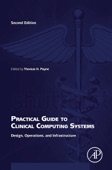Thomas Payne, MD
Professor of Medicine
Adjunct Professor, Departments of Health Services and Biomedical Informatics & Medical Education
Medical Director, Information Technology Services, UW Medicine

Ninth and Jefferson Building (Directions)
908 Jefferson Room 914
Seattle Washington 98104
tpayne at u.washington.edu
Box 359968
325 Ninth Ave
Seattle WA 98104-2499
Office:
Email:
Mail:
My work
My major professional interest is the use and evaluation of clinical computing systems, especially electronic health records (EHRs) in patient care, clinical research, and quality improvement. Most of my work since completing my fellowship has involved development, selection, installation and operation of EHRs. Since coming to the UW in 2000 I’ve been involved installation and improvements to our EHRs, and serving as Medical Director for the IT group serving UW Medicine. Before that, from 1997-2000 at VA Puget Sound, I served as the leader of the team that piloted the VA’s EHR, called CPRS. We served as the 3rd and largest test site for CPRS which has now been installed in all VA facilities and is widely regarded as successful. I’ve remained clinically active throughout my career.
Research interests
Electronic documentation. Much of what physicians and other health professionals document about their patients is in the form of notes: clinic notes, discharge summaries, progress notes, admission notes, and others. We know little about how these are created, how long it takes, what constitutes a “good note,” and what information they contain. Years ago Jan Hirschmann, Susan Helbig and I published a short paper titled “The Elements of Electronic Note Style” which has been a frequently cited (and copied) source of recommendations on how to write electronic notes. I have served on the UW faculty practice plan compliance committee and work with compliance and legal professionals interested in physician notes. At 2010 AMIA we presented a paper on The Physical Attractiveness of Electronic Physician Notes and in 2013 we had a panel on electronic notes. I was awarded a grant exploring ways to write more accurate, better notes and to do so faster than we do today. Several publications have come from this work, referred to as VGEENS.
Natural language processing. Most clinical notes and reports in electronic medical records are in narrative text form (“No text is free--somebody pays for it” [attributed to Octo Barnett]). To unlock contents of notes, we need natural language processing. I’m a student of this field because I believe there is enormous potential to understand care quality, patterns of illness, and to more easily manage the necessities of clinical care including professional fee billing. With colleagues at the UW, we have a grant to use NLP to extract important recommendations from radiology reports.
OpenNotes. I’m the Principal Investigator for the University of Washington in the multi-center effort to study the effects of patient viewing of their notes written during clinic visits. Harvard’s Beth Israel Deaconness is the overall lead for this work, funded by several foundations.
Operating clinical computing systems. After clinical computing systems have been installed, they have to be kept running. This requires supporting users, planning maintenance, recovering from downtime, and myriad other tasks that are less appreciated and understood than installation. This is the reason we organized our seminar series and wrote our book, in its second edition. I also plan to write more on this topic, including vulnerabilities of the clinical computing infrastructure that underlies EMRs and other clinical computing systems.
I’m active in the American Medical Informatics Association (AMIA) and served as Board Chair. I was program chair for the 2011 ACMI Winter Symposium and we published a paper based on that meeting. I’m on the faculty of the AMIA Clinical Informatics Board Review course which gives me the opportunity to meet and learn from hundreds of physicians interested in clinical informatics. I took the first Clinical Informatics Board Certification exam in 2013, and fortunately was part of the first cohort to be Board Certified in Clinical Informatics. I chaired the EHR 2020 Task Force and was asked to testify before the US Senate Health, Education, Labor and Pensions Committee on June 10, 2015. Click here for my testimony. I was chair of the 2015 AMIA Policy Invitational Policy Steering Committee.
I attended Medinfo in 2013 in Copenhagen, 2015 in Sao Paolo, and 2017 in Hangzhou.
Other professional interests
I spent a spring sabbatical at the University of Manchester studying clinical information exchange in the United Kingdom and was extremely impressed with what has been accomplished in England, Scotland (I was elected as Fellow of the Royal College of Physicians in Edinburgh) and Wales. People of the globe have a great deal to learn from each other; the United States can benefit from better understanding how other countries have approached similar health and public health challenges using information technology.
My research projects are described in Details.
I am Associate Director of the UW Medicine Center for Scholarship in Patient Care Quality and Safety. Along with colleagues at the University of Washington School of Public Health, I’ve been learning about how medical informatics can serve large populations around the globe. I’ve had opportunity to teach and learn from students and professionals in Lima, Bangkok, and Nairobi. I’ve given presentations and taught in India, Beirut, Qatar, Australia, Canada, Thailand, and Saudi Arabia.
Click here for Medline search for my publications or click here for my CV.
Click here for my Google Scholar profile.
Click here for my personal website.
Last updated 3/23/19
Our book, in 2014 second edition


